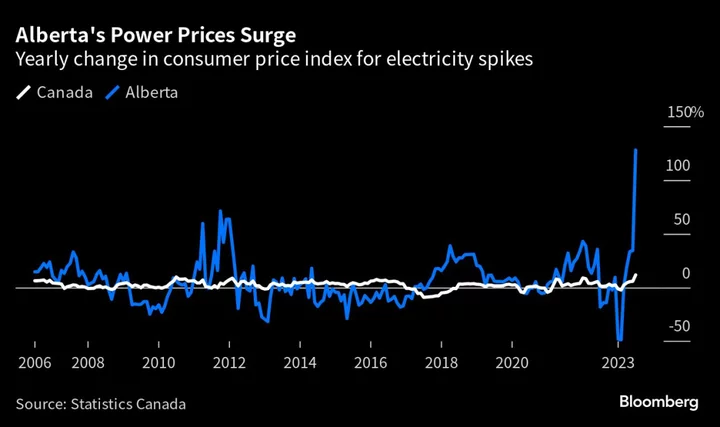Electricity prices in Alberta in July more than doubled from a year earlier, climbing to a record high and diverging the most ever from the Canadian average in data stretching back four decades.
The 128% surge in the province’s power prices was the primary cause of an 11.7% increase in those costs nationwide, Statistics Canada reported in consumer price index data released Tuesday.
Alberta’s electricity prices can be volatile, and summer heat is driving demand, the agency said. It also blamed base effects, pointing to a provincial rebate introduced in July 2022 that prompted a 24.4% monthly drop in prices. The rebate and a price cap kept costs lower for consumers until they were phased out and ended in spring of this year, Statistics Canada said.
However, National Bank of Canada Chief Economist Stefane Marion disagreed, citing the province’s population growth of about 200,000 people, or 5%.
“There is much more than a base-year effect at play,” Marion said in a report to investors. “Alberta’s electricity demand reflects not only the summer heat, but also record population growth. Looking ahead, we don’t see much respite for Albertans, given the federal government’s policy decision to decarbonize the electricity grid relatively quickly.”
Read more: Mixed Inflation Signals Give Bank of Canada Options on Rates
Prime Minister Justin Trudeau’s government is betting on mass immigration to stave off long-term economic decline and welcomed 1 million new arrivals last year. The record population growth has filled labor gaps and boosted the economy, but is testing the limits of Canada’s housing supply and other infrastructure.
At the same time, Trudeau has promised to phase out carbon emissions from electricity generation by 2035. Alberta relies on fossil fuels for 89% of its power, and Premier Danielle Smith said on Monday that her province will “never” implement the federal regulations.
She said her province — Canada’s major oil and gas producer — can achieve a net zero grid by 2050, but the federal timeline would risk blackouts and cost too much, carrying a price tag as high as C$400 billion ($297 billion).
Smith’s government recently announced a seven-month pause on wind and solar projects to review the use of agricultural and public lands and the role of municipal governments in selecting land for project development.
The province needs to address whether enough base-load power supply exists to prevent power cuts when wind and solar aren’t sufficient, she said.

